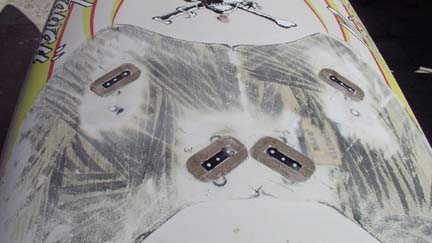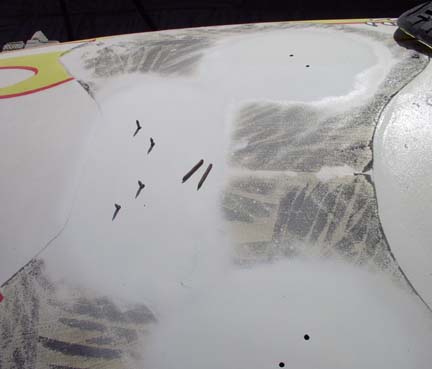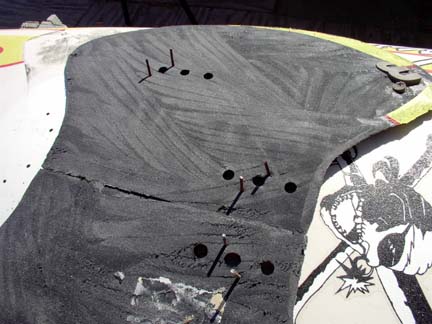|
| |
|
Installing Extra Foot Strap Inserts in way of Padz Folks with
particularly big feet usually like their foot straps further inboard than
they come from the factory. Some dedicated wave sailors want an aft strap
on the center. Some petite sailors want them closer together. The most
common reason for new insert requests are twisting straps, though. Whatever the
cause - adding foot strap inserts is not a big deal - but removing the Padz
is admittedly a pain in the bum.... |
 |
Chinook makes the inserts,
2-hole or 5-hole, that you can cut to suit, then glue into PVC foam with an
Epoxy paste, to give a
firm bond to the top skin. |
 |
After peeling up the pad
with a sharp single-edge razor blade, slicing carefully at the interface
between board and pad, slowly slowly, easy does it, being especially careful
around old inserts where the pad has compacted; laying out the new insert locations,
and cutting the holes with a router, the new inserts are installed with slow
Epoxy, filled with Q-Cells or such. |
 |
Once the bedding slurry has
cured, the adjacent surfaces are ground to bare glass, everything is glassed
over with (3) layers of 4oz fiberglass, overlapping about 1-2" all around,
then faired, primed, and coated with paint. To
mark the pad, I insert cut-off brads into the new foot strap holes,
carefully position the pad, then press it down onto the brads. |
 |
The brads will (usually)
stick to the pad, allowing you to mark the new foot strap screw holes. |
 |
Cut the new holes with a
hole punch, then reinstall the pad with contact cement.
Throughout my life, I have always tried to choose
whichever path is most beneficial to the environment. I do draw the line at
contact cement, however. It seems, the benign, Latex-based stuff simply does
not grip well enough, or hold long enough. So very sorry, but just this
once, I must recommend the gnarly, "bad" contact cement, the kind that
requests that all pilot lights be extinguished in the neighborhood. If your
favorite hardware store has it in big, 1-gallon cans, it is not the "right
stuff". Look for pint cans or little brown glass bottles instead! |
|
return
to Repair Menu |
|